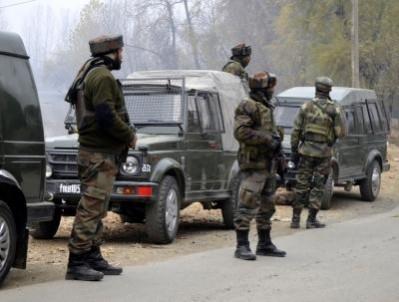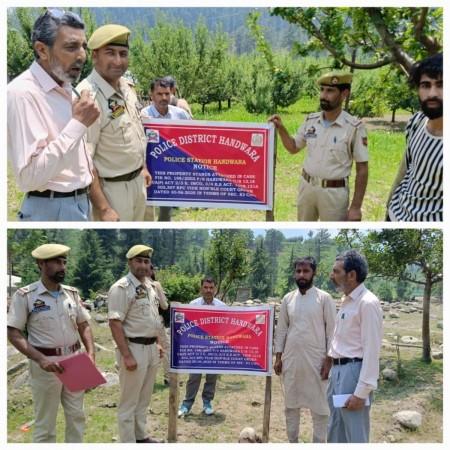
A Border Security Force (BSF) trooper, Sugam Choudhary, has mysteriously disappeared from his battalion headquarters in Srinagar, Jammu and Kashmir. Choudhary, who was part of the 60th BSF battalion, was last seen at his post in the Panthachowk area late Thursday evening. Despite extensive search efforts, he remains untraceable, raising significant concerns about his sudden absence.
Authorities have lodged a missing report and are actively investigating the circumstances surrounding Choudhary's disappearance. At this stage, it is unclear whether his absence was voluntary or if other factors are involved. This incident is particularly alarming given the current security situation in the region, which is on high alert.
The disappearance coincides with heightened security measures following the announcement of Operation Sindoor by New Delhi. This operation aims to avenge the killing of 26 civilians by Pakistan-backed Lashkar-e-Taiba (LeT) terrorists on April 22 in Pahalgam. The operation highlights the ongoing tensions and complex security challenges in Jammu and Kashmir.
Intensified security operations
In recent months, security forces have ramped up operations against terrorist elements in Jammu and Kashmir. A significant breakthrough was achieved with the elimination of three hardcore Pakistani terrorists responsible for the April 22 civilian killings. This operation, known as Operation Mahadev, took place in the upper reaches of Dachigam National Park, near the Mahadev mountain peak in the Harwan area of Srinagar district. Among the slain terrorists were LeT commander Suleman Shah and his associates, Abu Humza and Jibran Bhai.
The focus of security operations has shifted from targeting individual terrorists to dismantling the entire ecosystem that supports terrorism. This includes cracking down on overground workers (OGWs), sympathizers, and even drug smugglers involved in funding terrorist activities through illegal means such as hawala money rackets and drug smuggling.

In the last 100 days, security forces have successfully neutralized 12 terrorists, including the mastermind behind the Pahalgam attack. Of these, six were identified as Pakistani nationals, while the remaining six were local recruits involved in recent terror strikes. The mastermind was killed on July 28 during Operation Mahadev, which also resulted in the elimination of two other terrorists in the Dachigam area of Srinagar. This was followed by Operation ShivShakti in the Poonch sector, where two more terrorists were neutralized.
Ongoing threats and operations
The operations have not only targeted active terrorists but have also led to the arrest of several terror operatives and sympathizers. These efforts are part of a broader, months-long crackdown aimed at curbing the influence and activities of terrorist networks in the region. Security units across Jammu and Kashmir continue to conduct regular operations, making it challenging to pinpoint the exact number of missions being carried out.
The Army's Chinar Corps confirmed that an intense gunfight took place in the dense forests of Lidwas, located in the upper reaches of Dachigam. This area is strategically significant, as it is flanked by routes connecting Pahalgam in Anantnag and Ganderbal in north Kashmir. During the operation, security forces recovered a large cache of arms and ammunition, including a U.S.-made carbine, an AK-47 rifle, 17 rifle grenades, and other war-like stores. The discovery of a hideout with cooking utensils and food supplies suggests that the terrorists had been camping in the area for several days, possibly using it as a logistical hub or transit point.
Operation Sindoor
While the identification of the deceased terrorists is still underway, agencies are working to determine their affiliations, possible handlers, and whether they received cross-border support. The presence of multiple guns and other arms at the hideout indicates that the group was heavily armed and prepared for prolonged engagement, raising concerns about potential future attacks in Jammu and Kashmir.
Operation Sindoor has been a focal point of recent security efforts. This operation was launched in response to the killing of 26 civilians by LeT terrorists in Pahalgam. The strikes targeted nine locations, including four in Pakistan and five in Pakistan-occupied Jammu and Kashmir (POJK). These strikes were conducted between 01:05 AM and 01:30 AM on a Wednesday, with no military establishments targeted and no reports of collateral damage. However, Pakistan has claimed several civilian casualties, including women and children.
In response to the Indian strikes, Pakistan's Director General of Inter-Services Public Relations (DG ISPR) stated that all planes of the Pakistan Air Force are airborne and that Pakistan will respond at a time and place of its choosing. The statement emphasized that the temporary pleasure of India will be replaced by enduring grief, highlighting the ongoing tensions between the two countries.
Related
















